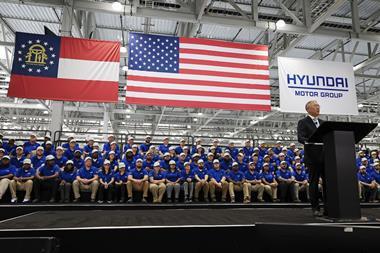
Fiat has been forced to close all five of its plants in Italy because of a transport strike that has been running for three weeks and which has prevented the delivery of finished vehicles that are now filling storage lots at facilities as well as compounds around the country. The action is also affecting inbound deliveries.
The strike has resulted in a loss of sales for Fiat of more than 20,000 vehicles, which it says it will find very difficult to recover in 2012.
"For March, the disruption caused so far is expected to have a negative impact on market share of around 10% in Italy and abroad," said the company in a statement. "The Italian automotive industry, which was already suffering significantly, is being further damaged by these stoppages," it added.
The Italian car market is going through a dramatic slump in sales with registrations down 20% in February compared to the same month last year according to the Ministry of Transport.
Protests by truck drivers opposed to the taxes on fuel introduced in the Italian government's austerity budget, have been affecting logistics services to Italy's car and truck makers since January (read more here).
On Friday, Fiat-Chrysler CEO, Sergio Marchionne, met Prime Minister Mario Monti for the first time since the strikes had begun but the company would not disclose any details of the meeting.
The action has drawn criticism from car carriers operating in the country. The Association of European Vehicle Logistics (ECG) has called for immediate action by the Italian government to prevent further action.
"Owners of small car-transport businesses in Italy have been protesting for some time over the current difficult economic climate, and we have sympathy for their predicament," said the ECG in a statement. "At the same time, we cannot accept protests that block access to car factories, terminals and compounds. Such action threatens the livelihoods of millions of workers and creates financial losses running into the tens of millions of euros for automakers, dealers and logistics operators themselves."
The association urged the authorities to intervene where such protests threatened the work of other sectors of the business by blocking access to compounds, plants and ports.
ECG president Costantino Baldissara said it was the worst stoppage ever seen and was down to the action of small truck owners or 'Padroncini', who were paralyzing the whole industry and confusing the issue by not making their requests clear. He called for a joint effort between the carmakers and logistics providers to overcome the problem.
"The fortunes of carmakers and of finished vehicle logistics providers are completely interconnected," Baldissara told Automotive Logistics. "This stoppage by Italian Padroncini is penalising the industry as a whole. Of course, providers are called to operate in a proactive manner to overcome every issue, but in a mature relationship between client and supplier, both players should understand that only by joining their efforts would they have more possibility to overcome a common problem."
Turning to the Italian authorities Baldissara said that the ECG was calling on them to support the rights of car carriers to operate in the country and safeguard the Italian road system so that providers could return to their work and operate freely.
Speaking from his role as commercial and logistics director of Italian forwarder Grimaldi, Baldissara said the strike was affecting the flow of vehicles to and from ports, which was making it difficult to plan and operate services.
"Up to now, thanks to its large network of Italian ports, Grimaldi has tried to reduce the impact by searching alternative routes that fit with clients' necessities and road connection possibilities," he said.
Minimising the impact on inbound supply
Efforts are also being made to reduce the impact of the problem on the inbound side. According to Ceva Logistics, which handles inbound and aftermarket services to Fiat amongst others, while the main part of action is hitting finished vehicle carriers, a service it does not provide in Italy, the current turmoil in the sector has caused the shutdown of some production facilities and hit the supply chains of automotive manufacturers.
"The direct consequences are loss of volumes, with the related loss of turnover, difficulty in recovering fixed costs and the increase in the costs of services," said spokesperson Danilo Schipani.
For its part Ceva is supporting the management of emergencies by minimising the impact on its customers by either recovering materials stuck in transit and carrying them to where the customer needs them, or by organising urgent shipments of goods that can substitute those that cannot be delivered.
Asked about the impact on its own business Schipani said it was difficult to make a specific evaluation because it depended on the length of the strike and how much Ceva's service will be influenced by it.
During the strike in January Ceva admitted that, for the industry in general, there were no possible alternative solutions for inbound services but said this week that logistics providers could play an active role by studying and reviewing flows with the aim of reducing their vulnerability. At the same time the company admitted that the fact that striking truckers are using roadblocks negates other contingencies such as identifying providers that are not adhering to the call for strike action. It can even risk further action designed to stop the initiatives aimed at overcoming the existing obstacles said Schipani.

























![Global[1]](https://d3n5uof8vony13.cloudfront.net/Pictures/web/a/d/s/global1_726550.svgz)










